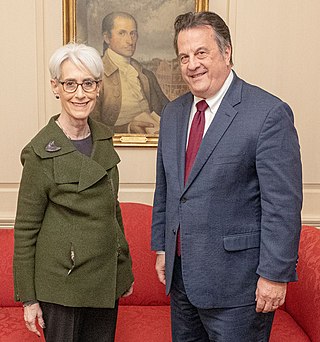Related Research Articles
Child marriage is a marriage or domestic partnership, formal or informal, usually between a child and an adult, but can also be between a child and another child.

Rania Al Abdullah is Queen of Jordan as the wife of King Abdullah II. Rania's domestic activities include education, youth, environmental, and health initiatives. Globally, she has campaigned for education and cross-cultural dialogue. She has authored three children's books: The Sandwich Swap, The King's Gift, and Enduring Beauty.
SOS Children's Villages is an independent, non-governmental, nonprofit international development organization headquartered in Innsbruck, Austria. The organization provides humanitarian and developmental assistance to families facing difficulties and supports children and young people without parental care or at risk of losing it. The organization also protects their interests and rights around the world. Today, SOS Children's Villages is active in more than 130 countries and territories worldwide.

Street children are poor or homeless children who live on the streets of a city, town, or village. Homeless youth are often called street kids, or urchins; the definition of street children is contested, but many practitioners and policymakers use UNICEF's concept of boys and girls, aged under 18 years, for whom "the street" has become home and/or their source of livelihood, and who are inadequately protected or supervised. Street girls are sometimes called gamines, a term that is also used for Colombian street children of either sex.
Children International is a global nonprofit humanitarian organization that helps children break the cycle of poverty. It addresses children’s critical needs through early intervention and regular interaction in community centers. The goal is to help children overcome the effects of poverty, support their education, and prepare youth to contribute to society.

Child in Need Institute is a humanitarian organisation promoting "Sustainable development in health, nutrition and education of children, adolescents and women in need" in India. With its headquarters based in Kolkata, the CINI operates in some of the most poverty stricken areas in India. Its international arm, Fondazione CINI International, is based in Verona, Italy.

David Gressly was the United Nations Resident Coordinator / Humanitarian Coordinator for Yemen Prior to that he was the United Nations Deputy Special Representative for the Democratic Republic of the Congo. He also previously served as Deputy Special Representative in the United Nations Multidimensional Integrated Stabilization Mission in Mali (MINUSMA).

A talibé is a boy, usually from Senegal, the Gambia, Guinea, Guinea-Bissau, Chad, Mali or Mauritania, who studies the Quran at a daara. This education is guided by a teacher known as a marabout. In most cases talibés leave their parents to stay in the daara.
UNICEF, originally the United Nations International Children's Emergency Fund, officially United Nations Children's Fund since 1953, is an agency of the United Nations responsible for providing humanitarian and developmental aid to children worldwide. The organization is one of the most widely known and visible social welfare entities globally, operating in 192 countries and territories. UNICEF's activities include providing immunizations and disease prevention, administering treatment for children and mothers with HIV, enhancing childhood and maternal nutrition, improving sanitation, promoting education, and providing emergency relief in response to disasters.

A proportion of children in India are engaged in child labour. In 2011, the national census of India found that the total number of child labourers, aged [5–14], to be at 10.12 million, out of the total of 259.64 million children in that age group. The child labour problem is not unique to India; worldwide, about 217 million children work, many full-time.

Zilda Arns Neumann was a Brazilian pediatrician and aid worker.
Samir Chaudhuri is an Indian pediatrician and humanitarian. He is the founder (1974) and director of the Child In Need Institute (CINI), also known as Child In Need India, an organisation that works to facilitate sustainable development in health, nutrition, education and protection of children, adolescents and women in need, and President of its international arm, CINI International.
Child marriage in India in Indian law is a marriage in which both the bride and the groom are less than 21 years of age. Most child marriages involve girls younger than 21, many of whom are from poor families.

Caritas Internationalis is a confederation of 162 national Catholic relief, development and social service organisations operating in over 200 countries and territories worldwide. The name Caritas Internationalis refers to both the global network of Caritas organisations and to its general secretariat based in the Vatican City in Rome, Italy.

Armenia was admitted into the United Nations on 2 March 1992, following its independence from the Soviet Union. In December 1992, the UN opened its first office in Yerevan. Since then, Armenia has signed and ratified several international treaties. There are 20 specialized agencies, programs, and funds operating in the country under the supervision of the UN Resident Coordinator. Armenia strengthened its relations with the UN by cooperating with various UN agencies and bodies such as the International Monetary Fund, the World Bank, the World Food Programme, and with the financial institutions of the UN. Armenia is a candidate to preside as a non-permanent member of the UN Security Council in 2031.

Child Friendly Spaces (CFS) are safe spaces set up in emergency settings to help support and protect children. Their objective is to restore a sense of normality and continuity to children whose lives have been disrupted by war, natural disaster, or other emergencies. They provide children with opportunities to develop, play, learn, and strengthen resiliency either after a crisis or during a protracted emergency in a safe, child friendly, and stimulating environment. NGOs or governments design and operate CFS in a participatory manner, often relying on community support. They are a short- to medium-term program response and often operate in tents or temporary structures. CFS are one of the most widely used child protection and psychosocial support interventions in emergencies. One reason for their popularity is that they offer potential for adaptability of activities to diverse contexts, rapid deployment, and low relative costs. Different agencies refer to CFS by different names including Child Centered Spaces (CCS), Safe Spaces, Safe Play Areas, and Child Friendly Spaces/Environments (CFS/E).

Eliana Bórmida is an Argentine architect, co-owner of the Bórmida & Yanzón studio, based in Mendoza, Argentina and specializing in wine cellars. Since 1988 the studio has worked on projects for more than 30 wineries, which have been disseminated in national and international media, and several have received awards. Bórmida combines her activity at the studio with academic pursuits, developing an extensive career in the field of heritage preservation. In 2012 she received the Konex Award for Architecture.

India is the most populated country in the world with nearly a fifth of the world's population. According to the 2022 revision of the World Population Prospects the population stood at 1,407,563,842.
Patrice Lee Engle was a developmental psychologist known as a pioneer in the field of global early childhood development and for her international work advocating for children's education and healthcare. She was Professor of Psychology and Child Development at California Polytechnic State University, San Luis Obispo.
Susan Ngongi Namondo is a Cameroonian animal scientist, public administrator and diplomat, who serves as the United Nations' representative and coordinator in Uganda, since June 2021. Immediately before that, from 2017 until 2021, she served in the same capacity in Eritrea, based in the city of Asmara, the capital of that country.
References
- ↑ "CYE 13(2) Editorial Advisory Board". Archived from the original on 2008-06-17. Retrieved 2011-01-08.
- ↑ Riggio, Eliana & Kilbane, Theresa (October 2000). "The international secretariat for child-friendly cities: a global network for urban children". Environment & Urbanization . 12 (2): 201–205. Bibcode:2000EnUrb..12..201R. doi:10.1177/095624780001200216 – via SageJournals.